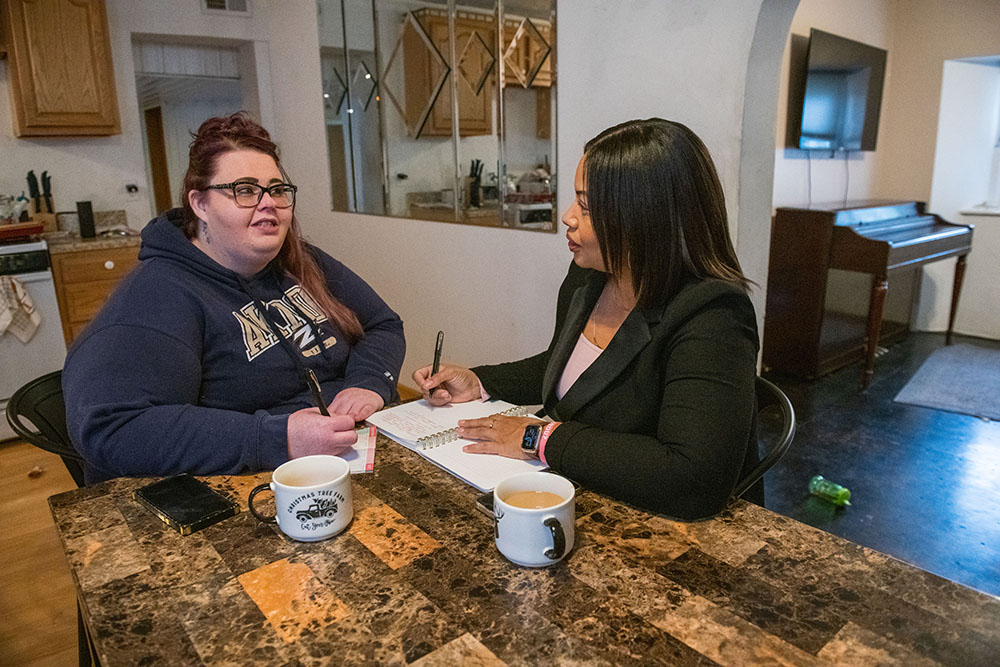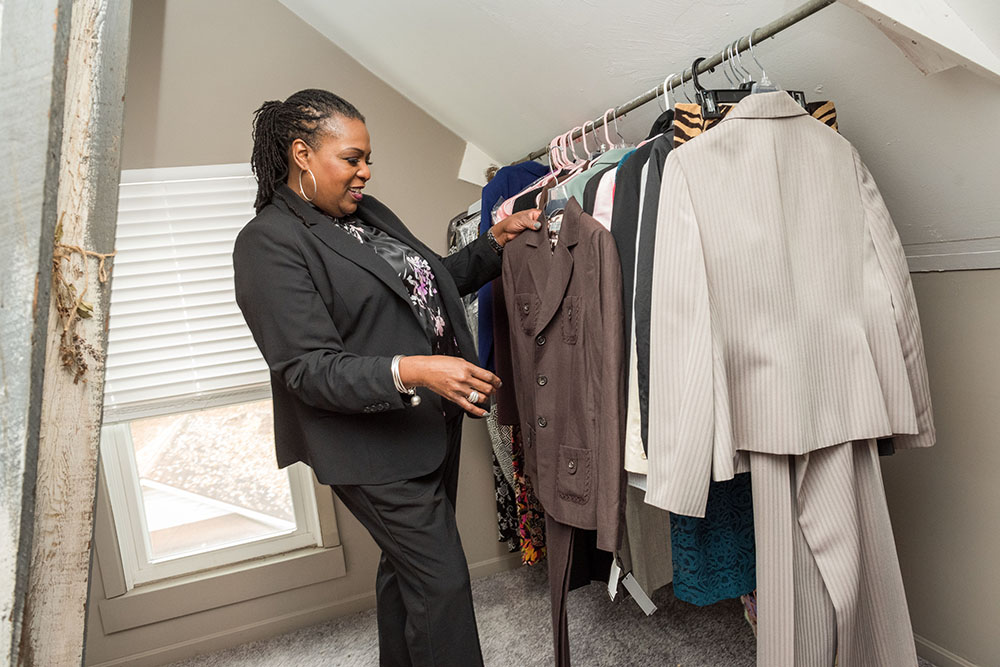Grassroots Growth
By Olivia Eastly, Marketing & Communications Coordinator
Small nonprofits find new opportunities for growth amid the pandemic
Over the past few years, everyone has been affected by the COVID-19 pandemic, but younger, more grassroots organizations were especially transformed. Small organizations that were previously flourishing faced a dilemma and had to adapt quickly. Despite the odds, some groups rose to the challenge and grew during the pandemic.
From Grassroots Growth to Regional Expansion

(Photo by Dale Dong)
Women Revived Ministries began in July 2019 in the driveway of the house Rachel Socorro acquired out of her experience in human trafficking.
"We built our whole organization through grassroots (efforts), with money from us ladies' pockets," Socorro recalled with a fond smile on her face.
Socorro is a survivor of human trafficking and has made it her mission in life to help other survivors thrive. But shortly after attaining 501(c)(3) status in October 2019, the pandemic hit the Akron community hard, and Socorro, as the founder and executive director of Women Revived Ministries, had to change course.
"COVID-19, for me, was what launched us into the growth we've seen over the last 18 to 24 months. It really exposed a lot of vulnerabilities we as humans experience," Socorro said. "As we grew as an organization, we were able to recognize, address and serve those vulnerabilities. So we grew quickly before we realized what was happening."
As a survivor herself, Socorro is familiar with the challenges women face when escaping from human trafficking. That knowledge made a difference when she approached Akron Community Foundation about funding one of Women Revived Ministries' keystone programs: Operation Promise Land.
Akron Community Foundation gave the organization its first-ever grant to support Operation Promise Land in December 2021. The program provides a safe and supportive space for survivors of human trafficking and other violent situations. Participants are also offered ongoing peer support and resources for rebuilding their identity through economic empowerment and education.
"Akron Community Foundation was really the first organization to come along beside us, not only by funding us, but by mentoring and developing me as a director and leader," Socorro said. "The money is important, but the knowledge, mentorship and development is equally important."
Socorro and her organization have both changed tremendously in the past three years, but even as Women Revived Ministries begins expanding its services to the counties surrounding Akron, Socorro remains dedicated to transforming the city into a place of peace and prosperity.
As of October 2022, the organization has five safe spaces accessible at most times within the city limits. Socorro explained that these spaces have low barriers to entry, allowing survivors to get the help they need without hitting red tape or becoming discouraged from establishing a new life for themselves.
"If we're really going to help, the people we are serving have to have easy access," she said.
Women Revived Ministries is now focused on providing survivors of all forms of trauma with a pathway to "Total Life Wellness." This eight-week holistic health program combines education with wellness classes, building on the peer support model that was so instrumental to Operation Promise Land.
The Pandemic as a Blessing and a Curse

(Photo by Dale Dong)
Karla McDay opened the first Harmony House shelter in 2014, long before the pandemic. Prior to that, there was no shelter specific to young adults experiencing homelessness in the community.
"With zero funding, I rented a small house in East Akron from a very compassionate landlord who happened to be my dad. I got cheap rent," McDay said. "This was a single-family home, so we had four bedrooms, and each participant was responsible for paying $10 a day."
That $10 provided residents between the ages of 18 and 26 with shelter, gas, electricity, water, Wi-Fi, cable, a landline telephone, a computer, a mailing address, donated clothes, donated food, and free laundry facilities.
Those expenses doubled in 2018 when McDay opened a second shelter in West Akron. Then, in 2019, she opened a home for young women. When the pandemic hit in 2020, everything became a lot more expensive. Suddenly, there were extra expenses to account for: everything from masks and hand sanitizer to gloves and cleaning supplies.
"During the midst of the pandemic, we had just recently opened a third house," McDay said. "For the first time, we had a girls' house. But because it was the middle of the pandemic, Akron Community Foundation gave us some funding that assisted us with getting the house furnished and getting the COVID precautionary items we needed."
A grant from Akron Community Foundation's Community Response Fund for Nonprofits was the first foundation funding McDay ever received for the program, and it started a chain reaction that changed Harmony House's funding model.
"COVID came about, and it was a blessing and a curse in some ways," McDay said. "Because we didn't want to see young people homeless in our community, (the community) made dollars available. So I was able to get away from the $10 (model) and people were able to stay at a house through sponsorship."
McDay gives credit to the community foundation for the wave of funding that has allowed Harmony House to support more young people.
"Once you get funding from Akron Community Foundation… it makes people see you in a different light. It shows that you're credible. It gives exposure," she said.
Now, the organization continues to grow through local and federal funding. They also received a capital grant from the community foundation in its recent round of funding.
"We've gone from one house in East Akron with four beds, to one house in West Akron with four beds, and now 10 apartments that are throughout the community," McDay said.
Harmony House is now able to host 26 young people in the city, "and that's a lot to start from $10 a day and a dream," she said.
Despite what McDay has accomplished as executive director of Harmony House, she emphasized that it's a lot of work for a small team.
"One of the good things about Akron Community Foundation's funding (is that) some of it has been for operating (expenses)," McDay said. "That's what nonprofits need."
Challenges Drive Innovation

Wendy Duke and Laura Valendza co-founded the Center for Applied Drama and Autism in 2012 and began teaching acting classes to middle school students on the weekends. But it wasn't until 2015 that they received their first foundation funding in the form of a grant from the Millennium Fund for Children of Akron Community Foundation, which began a long-standing relationship between the foundation and the center.
CADA is best known for a production of Tennessee Williams' "The Glass Menagerie" in which the main character, Laura, is portrayed as a young woman with autism. Anna-Jeannine Kemper Griesacker, interim executive director of CADA, said that show was dependent on the studio getting its own space, which would not have been possible without the support of Akron Community Foundation.
"That was the first vote of confidence from the community," she said. "It was a show of faith, and CADA took it and ran with it."
Then the pandemic forced many theaters to close their doors for two years. Despite the setback, the staff at CADA used it as an opportunity to innovate and reach a wider audience. Griesacker observed the changes at CADA even before she accepted a job with the organization in April 2022.
"They really pivoted in one week," she said. "In one week, they announced their spring class series, and then everyone's life changed, and they turned right around and announced a full series of online courses."
Those online classes and performances made theater accessible to a larger audience, not only in Akron, but throughout the entire Northeast Ohio region.
"If you look at people who performed online or watched theatrical shows online, some of them had never been in a production or done drama before," Griesacker said. "Some of them had never even watched drama before. Now they can do it from their living room."
Since becoming the interim executive director after Duke retired in August 2022, Griesacker has found more than financial support through Akron Community Foundation.
"It's more than just being willing to give us funds that are often not as restricted as some of the other grants we receive," she said. "It's also being able to have a person that supports you. It's so approachable to have a foundation that's here in the community."
ACF and Nonprofits as Partners
As our community grapples with rising costs, worker and volunteer shortages, health stressors, and other continued repercussions of the pandemic, Akron Community Foundation is committed to helping nonprofits navigate this ever-changing landscape, whether it's through grant funding, workshops, informational events, networking, or making connections with the foundation's many fundholders.
"It's important for us to fund these smaller, grassroots organizations, while also acknowledging that they may need more than just financial support," said John Garofalo, vice president of community investment. "It is our philosophy that the mentorship, training and one-on-one consultation we provide to these organizations is sometimes more valuable than the grant itself."
As many nonprofits can attest, a bright spot over the past few years has been the emergence of leaders who are guiding their organizations to new heights as they find creative ways to meet the critical needs of their neighborhoods. And just as crucial are the partnerships the community foundation continues to foster with these grassroots organizations.
Learn more about Akron Community Foundation's funding at www.akroncf.org/Grants.
More Equitable Grantmaking
In late 2021, Akron Community Foundation asked dozens of diverse nonprofit leaders to participate in a Racial Equity Impact Assessment of our competitive grantmaking process, with the goal of ensuring our grantmaking is as inclusive and equitable as possible. Understanding that every nonprofit has different grant writing capabilities, we sought to make our grant application process more streamlined, less redundant and easier to follow.
To assist those who are applying for their first grant from the community foundation (and for some their first grant ever), we created two versions of the application – one for first-time applicants and one for returning applicants. Also new to the process is the ability to upload a video. Applicants have the option to verbally tell their story and provide information that may not have been covered elsewhere on the application, but would be important for our board to consider when making grant decisions.
Akron Community Foundation hosted a webinar this summer to roll out the updated application to grantees. To view the webinar, visit www.akroncf.org/GrantUpdate.
